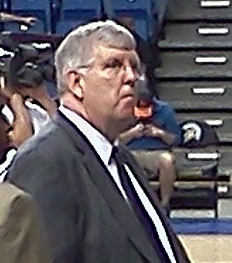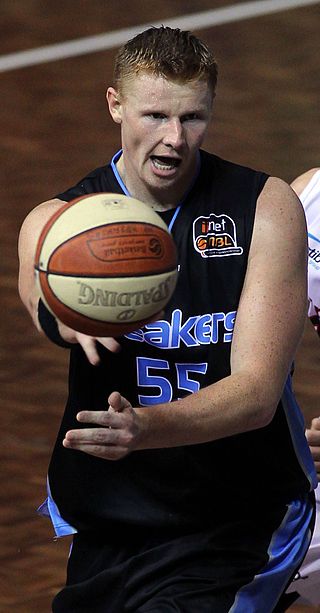
The Dee Glen Smith Spectrum is a 10,270-seat multi-purpose arena in the western United States, located on the campus of Utah State University in Logan, Utah. Best known as the home of the Utah State Aggies men's and the women's basketball teams, it also hosts gymnastics, volleyball, and other sporting events. The elevation at street level is approximately 4,770 feet (1,450 m) above sea level.

Stewart Morrill is an American college basketball coach and the former head coach of the Utah State University men's basketball team.

The Utah State Aggies are the intercollegiate athletic teams that represent Utah State University, located in Logan, Utah. Utah State fields 16 – seven men and nine women –National Collegiate Athletic Association (NCAA) varsity athletic teams. They compete in the Mountain West Conference. On September 23, 2024, Utah State reportedly accepted an offer to leave the Mountain West and join the Pac-12 on July 1, 2026.

Jaycee Don Carroll is a former American-born naturalized Azerbaijani professional basketball player. He has also represented the senior Azerbaijani national team. While playing college basketball for the Utah State University Aggies, he was best known for his scoring prowess, shooting ability, shooting range, and endurance. He has the 2nd highest 3 point field goal percentage in NCAA Division I history. He is the Aggies' all-time scoring leader, and also holds 9 other school records. When he finished his college basketball career, he had the 14th most 3 pointers made, and 52nd most points scored in NCAA DI history.

Donald Gene Verlin is an American college basketball coach who was most recently the head coach at the University of Idaho from 2008 to 2019. Prior to Idaho, Verlin was an assistant coach at Colorado State, Utah State, and Cal State Bakersfield.

The 2009–10 Utah State Aggies men's basketball team represented Utah State University in the 2009–10 college basketball season. This was head coach Stew Morrill's 12th season at Utah State. The Aggies played their home games at the Dee Glen Smith Spectrum and are members of the Western Athletic Conference. They finished the season 27–8, 14–2 to capture the regular season championship for the third consecutive year. They advanced to the championship game of the 2010 WAC men's basketball tournament before losing to New Mexico State. They received an at–large bid to the 2010 NCAA Division I men's basketball tournament, earning a 12 seed in the South Region, where they lost to 5 seed and AP #23 Texas A&M in the first round.

The 2009–10 New Mexico State Aggies men's basketball team represented New Mexico State University in the 2009–10 college basketball season. This was Marvin Menzies 3rd season as head coach. The Aggies played their home games at Pan American Center and competed in the Western Athletic Conference. They finished the season 22–12, 11–5 in WAC play. They won the 2010 WAC men's basketball tournament to earn the conference's automatic bid to the 2010 NCAA Division I men's basketball tournament. They earned a 12 seed in the Midwest Region where they were defeated by 5 seed and AP #13 Michigan State in the first round.

The 2010–11 Utah State Aggies men's basketball team represented Utah State University during the 2010–11 NCAA Division I men's basketball season. The Aggies, led by thirteenth year head coach Stew Morrill, played their home games at the Dee Glen Smith Spectrum and are members of the Western Athletic Conference. They finished the season 30–4, 15–1 in WAC play to win their 4th consecutive regular season conference title. They also won the 2011 WAC men's basketball tournament to earn an automatic bid in the 2011 NCAA Division I men's basketball tournament.

Gary Kristopher Wilkinson is an American retired professional basketball player. He played college basketball at Utah State and has played previously for professional teams in Greece, South Korea, New Zealand, Estonia and Puerto Rico.

The 2011–12 Utah State Aggies men's basketball team represented Utah State University in the 2011–12 college basketball season. This was head coach Stew Morrill's fourteenth season at Utah State. The Aggies played their home games at the Smith Spectrum and are members of the Western Athletic Conference. They finished the season 21–16, 8–6 in WAC play to finish in fourth place. They lost in the quarterfinals of the WAC Basketball tournament to Louisiana Tech. They were invited to the 2012 CollegeInsider.com Tournament where they defeated Cal State Bakersfield, Idaho, Loyola Marymount and Oakland to advance to the championship game where they fell to Mercer.

The 2012–13 Utah State Aggies men's basketball team represented Utah State University in the 2012–13 college basketball season. This was head coach Stew Morrill's fifteenth season at Utah State. The Aggies played their home games at the Smith Spectrum and were in their final year as members of the Western Athletic Conference. In July 2013, the Aggies will become full members of the Mountain West Conference. They finished the season 21–10, 11–7 in WAC play to finish in a tie for fourth place. They lost in the quarterfinals of the WAC tournament to Texas–Arlington. With over 20 wins, they Aggies would have been considered to participate in the CBI or CIT. However, citing injuries, the Aggies chose not to play in a postseason tournament ending a streak of 13 straight postseason appearances.

The 2013–14 Utah State Aggies men's basketball team represented Utah State University in the 2013–14 NCAA Division I men's basketball season. This was head coach Stew Morrill's 16th season at Utah State. The Aggies played their home games at the Smith Spectrum and this was their first year as a member of the Mountain West Conference. They finished the season 18–14, 7–11 in Mountain West play to finish in a tie for eighth place. They advanced to the quarterfinals of the Mountain West Conference tournament where they lost to San Diego State.

The 2014–15 Utah State Aggies men's basketball team represented Utah State University in the 2014–15 NCAA Division I men's basketball season. This was head coach Stew Morrill's 17th and final season at Utah State. The Aggies played their home games at the Dee Glen Smith Spectrum and were a member of the Mountain West Conference. They finished the season 18–13, 11–7 in Mountain West play to finish in a tie for fourth place. They lost in the quarterfinals of the Mountain West tournament to Wyoming.

The 2018–19 Utah State Aggies men's basketball team represented Utah State University in the 2018–19 NCAA Division I men's basketball season. The Aggies, led by first-year head coach Craig Smith, played their home games at the Smith Spectrum in Logan, Utah as members of the Mountain West Conference. The Aggies shared the regular-season Mountain West title with Nevada, and defeated New Mexico, Fresno State, and San Diego State to win the Mountain West tournament to earn the Mountain West's automatic bid to the NCAA tournament for their first appearance since 2011. They lost in the first round of the NCAA Tournament to Washington.

The 2019–20 Utah State Aggies men's basketball team represented Utah State University in the 2019–20 NCAA Division I men's basketball season. The Aggies, led by second-year head coach Craig Smith, played their home games at the Smith Spectrum in Logan, Utah as members of the Mountain West Conference. They finished the season 26–8, 12–6 in Mountain West play to finish in a three-way tie for second place. They defeated New Mexico, Wyoming and San Diego State to become champions of the Mountain West tournament, their second consecutive Mountain West tournament championship. They earned the Mountain West's automatic bid to the NCAA tournament. However, on March 12 it was announced that the NCAA Tournament would be cancelled due to the COVID-19 pandemic.

The 2020–21 Utah State Aggies men's basketball team represented Utah State University in the 2020–21 NCAA Division I men's basketball season. The Aggies, led by third-year head coach Craig Smith, played their home games at the Smith Spectrum in Logan, Utah as members of the Mountain West Conference. They finished the season 20–9, 15–4 in Mountain West play to finish in second place. In the Mountain West tournament, they defeated UNLV and Colorado State before losing to San Diego State in the championship game. They received an at-large bid to the NCAA tournament as the No. 11 seed in the South region, where they lost to Texas Tech in the first round.

The 2008–09 Utah State Aggies men's basketball team represented Utah State University in the 2008–09 college basketball season. This was head coach Stew Morrill's 11th season at Utah State. The Aggies played their home games at the Dee Glen Smith Spectrum and were members of the Western Athletic Conference. They finished the season 30–5, 14–2 to capture the regular season championship for the second straight year. They also won the 2009 WAC men's basketball tournament to earn an automatic bid to the 2009 NCAA Division I men's basketball tournament. As No. 11 seed in the West Region, they lost to No. 6 seed and AP #23 Marquette in the first round.

The 1999–2000 Utah State Aggies men's basketball team represented Utah State University in the 1999–2000 college basketball season. This was head coach Stew Morrill's 2nd season at Utah State. The Aggies played their home games at the Dee Glen Smith Spectrum and were members of the Big West Conference. They finished the season 28–6, 16–0 to capture the regular season championship. They also won the Big West tournament to earn an automatic bid to the 2000 NCAA Division I men's basketball tournament as No. 12 seed in the South Region. Entering play on a 19-game winning streak, the Aggies lost to No. 5 seed and AP #20 Connecticut in the first round.

The 2000–01 Utah State Aggies men's basketball team represented Utah State University in the 2000–01 college basketball season. This was head coach Stew Morrill's 3rd season at Utah State. The Aggies played their home games at the Dee Glen Smith Spectrum and were members of the Big West Conference. They finished the season 28–6, 13–3 to finish second in the regular season standings. They won the Big West tournament to earn an automatic bid to the 2001 NCAA Division I men's basketball tournament as No. 12 seed in the East Region. The Aggies upset No. 5 seed Ohio State in the opening round before falling to No. 4 seed UCLA in the round of 32.

The 2005–06 Utah State Aggies men's basketball team represented Utah State University in the 2005–06 college basketball season. This was head coach Stew Morrill's 8th season at Utah State. The Aggies played their home games at the Dee Glen Smith Spectrum and were members of the Big West Conference. They finished the season 23–9, 11–5 to finish second in the regular season standings. They lost to Nevada in the championship game of the WAC tournament, but received an at-large bid to the 2006 NCAA Division I men's basketball tournament as No. 12 seed in the East region. The Aggies fell to No. 5 seed Washington in the opening round.









